Key takeaways:
- Each venue has its own personality that can significantly influence the experience of performances held within.
- Key aspects to consider when selecting a venue include capacity, accessibility, ambiance, facilities, and location.
- Understanding the audience’s preferences and engaging with the community can enhance event attendance and satisfaction.
- Emotional connections and instincts play a crucial role in making the final venue decision, alongside logistical and budget considerations.
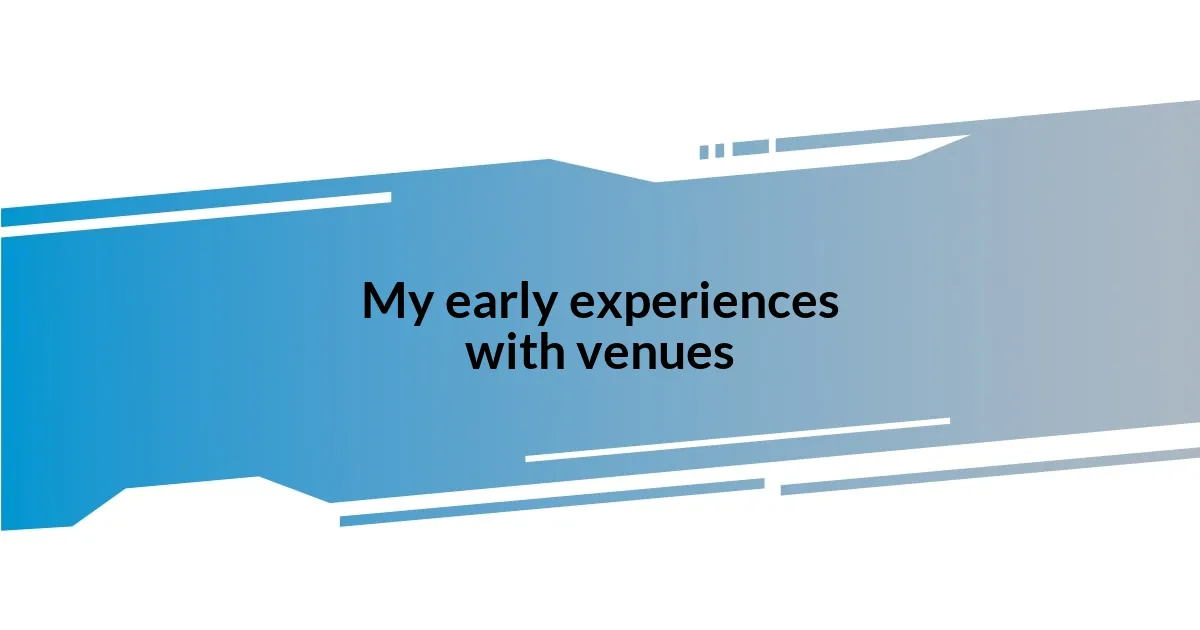
My early experiences with venues
I remember my first venue tour vividly, standing in the middle of a grand hall with echoes of laughter and music swirling in the air. It felt surreal to imagine all the stories that stage had witnessed; it was a moment that ignited my passion for exploring how spaces shape experiences. Have you ever felt a place speak to you, wrapping you in its history?
Another early experience that stands out was a small community theater tour. The intimate setting was a far cry from the grandeur of larger venues but had its own magic. I could practically feel the excitement of the casts and crew; the energy was palpable, and it made me wonder how often these hidden gems are overlooked. It was a reminder that sometimes, the best experiences don’t require a sprawling audience — just a shared love for performance.
One of the most striking things I learned during those early tours was how each venue carries its personality, from the architecture to the ambiance. Walking through a converted warehouse, I felt an undeniable grit and authenticity that permeated every corner. It made me question how much the venue itself influences the art being performed within its walls. Isn’t it fascinating how a simple change of scenery can transform one’s perception of a performance?
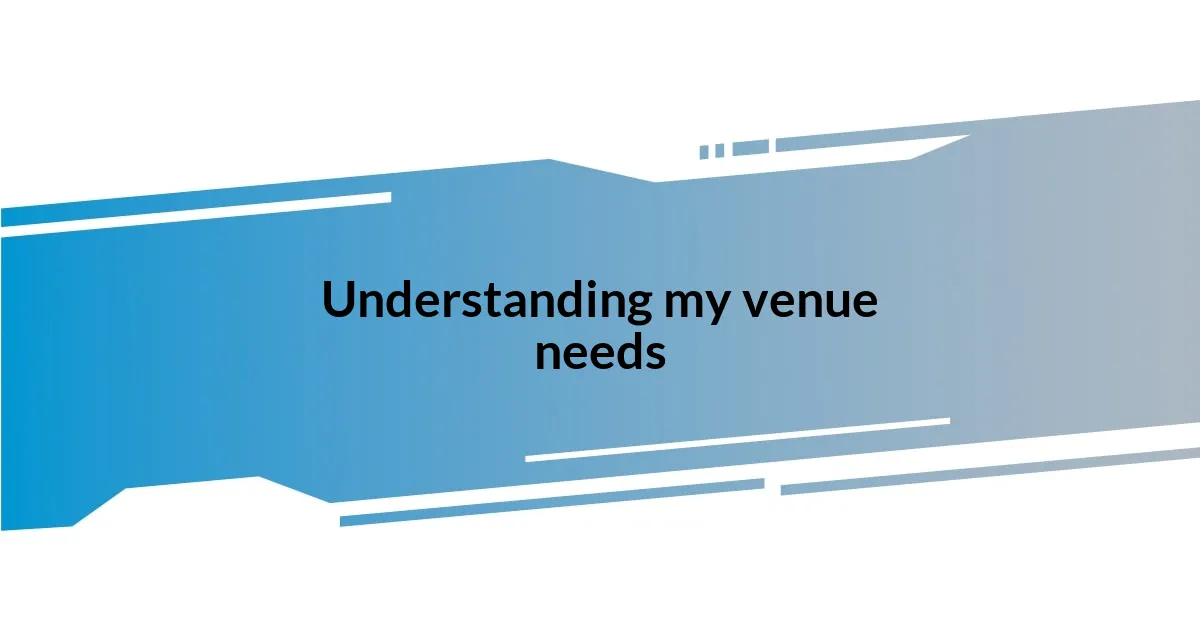
Understanding my venue needs
Understanding my venue needs goes beyond just picking a space. It’s about aligning the venue’s atmosphere with the experience I want to create. For instance, there was a time when I visited a stunning outdoor amphitheater for a concert. The moment I stepped in, the lush greenery and the openness of the sky made me realize how much a natural setting could enhance the musical experience.
When evaluating potential venues, I consider several key aspects:
- Capacity: How many guests can comfortably fit?
- Accessibility: Is it easy for everyone to get there?
- Ambiance: Does the vibe of the space complement the event?
- Facilities: Are there adequate amenities for performers and guests?
- Location: Is it conveniently located for my audience?
Each element plays a crucial role in ensuring that my vision comes to life, making the event unforgettable. I’ve learned that neglecting even one need can overshadow the entire experience.
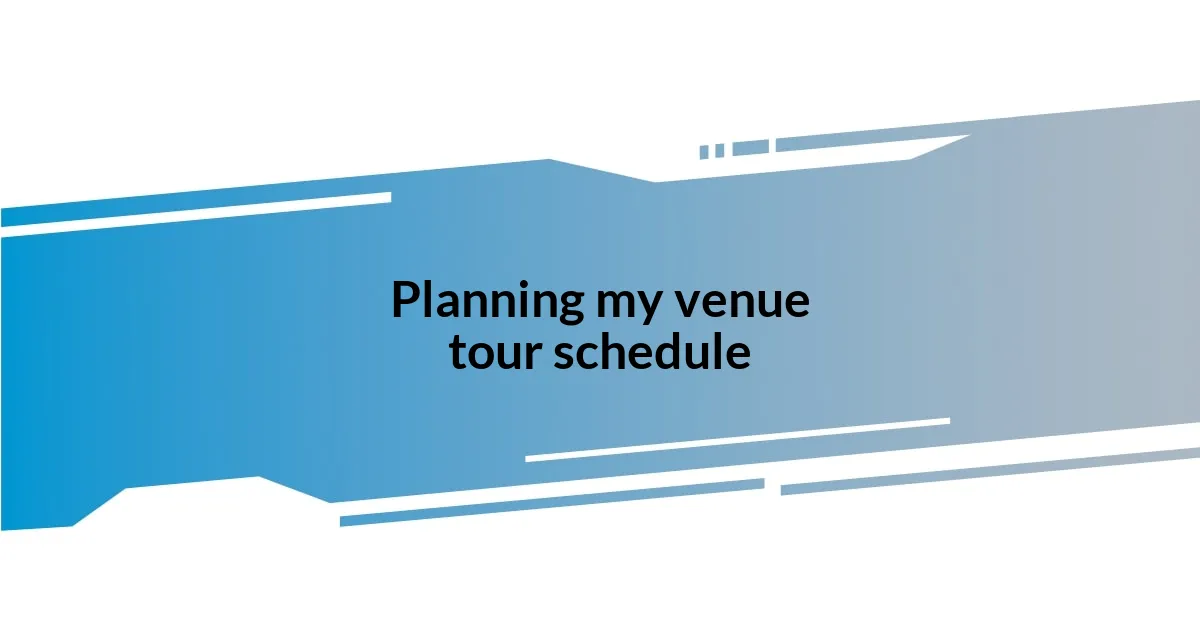
Planning my venue tour schedule
Finding the right venues for my tour schedule is always an exciting challenge. I like to start with a checklist of potential sites; it helps me visualize how everything will fit together. I recall during one of my early planning phases, I discovered a beautiful gallery space that just grabbed my attention. Mapping out visits across various neighborhoods became more than a task; it turned into a personal journey where each place told its own story.
As I plan, the time of year definitely influences my choices. I remember a spring tour I organized, where I prioritized venues with outdoor options. The fresh air and blooming flowers created an atmosphere that energized both the audience and the performers. It’s those little details, like seasonality, that make a significant impact on the overall experience. Have you ever planned an event around a specific season? It can really elevate the mood!
Balancing the schedule around my audience’s availability is one of the hardest parts of venue planning. I often use feedback from past events to gauge preferences. For instance, one year, I noted that weekend shows had much higher attendance thanks to a good-natured campaign I ran asking for input. Incorporating this feedback into my planning not only improves turnout but also strengthens my connection with the community.
| Key Aspects of Venue Planning | Personal Experience |
|---|---|
| Flexibility with Dates | I prefer weekends for better attendance based on my audience’s feedback. |
| Seasonal Considerations | Spring events in outdoor venues enhance mood and overall experience. |
| Community Engagement | Asking for input has made my events feel more connected and well-received. |
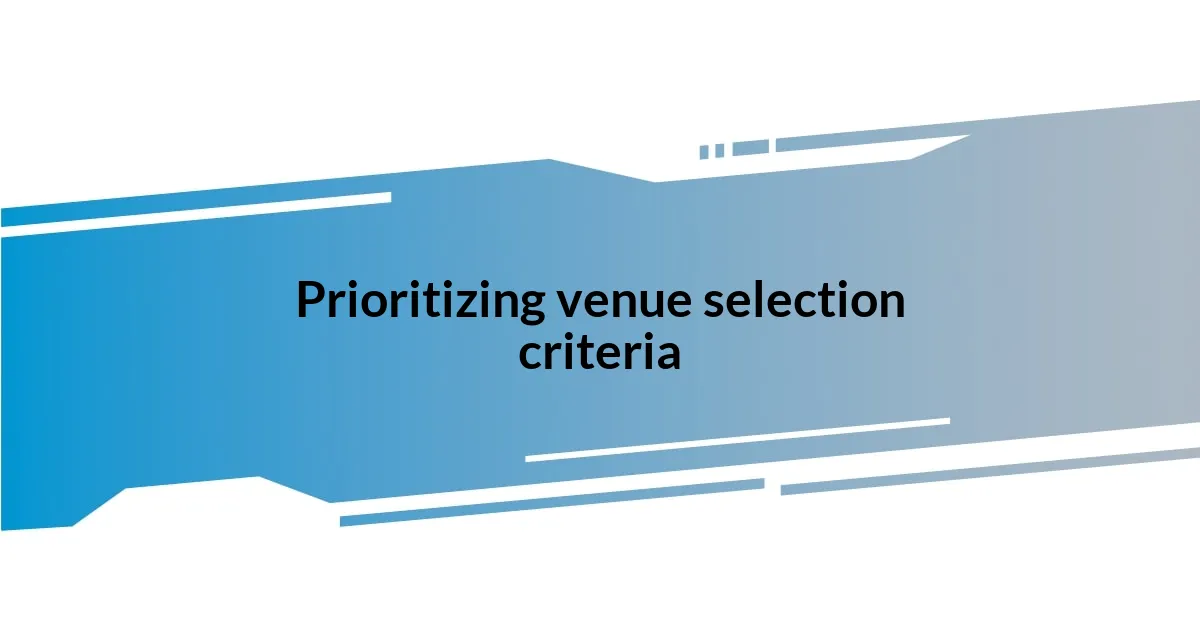
Prioritizing venue selection criteria
Selecting the right venue starts with clearly defined criteria, and for me, it’s an exercise in balancing logic with emotion. During one of my venue tours, I found myself captivated by a historic theater with ornate details. As I walked through the main hall, I couldn’t help but imagine the vibrant energy of the crowd and how that space could elevate an ordinary performance into something truly magical. This experience taught me that ambiance isn’t just about aesthetics; it’s about the feelings those elements evoke.
One thing I’ve learned is that the layout of the venue can significantly affect the flow of the event. I remember a time when I visited a conference center with a convoluted setup. I could see how guests might feel lost or overwhelmed, which highlighted for me the importance of a straightforward design. Have you considered how a simple layout might enhance guest engagement? I often prioritize venues that have a natural flow, allowing people to move freely, gather easily, and immerse themselves in the event.
I also prioritize accessibility, as it’s essential to ensure that all my guests can enjoy the experience. Reflecting on a past event, I chose a venue that was centrally located but overlooked parking availability and transit options. The result? A significant number of attendees arrived late, and that’s a feeling I never want to encounter again. Since then, I’ve made it a point to double-check transportation options. It’s a small detail with a big impact, and I firmly believe that everyone deserves a seamless experience from start to finish.
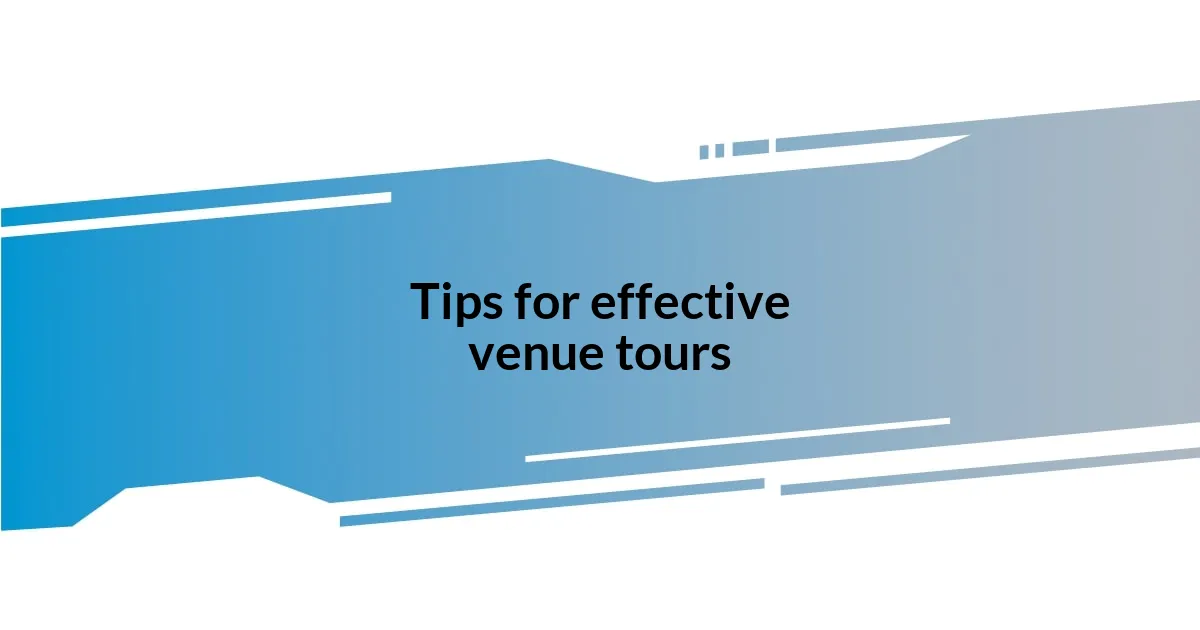
Tips for effective venue tours
When embarking on a venue tour, I found that asking the right questions can hugely influence the outcomes. An experience that stands out is when I visited a space that seemed perfect at first glance. However, I dug deeper and asked about the sound system and available lighting options. It turned out they weren’t up to par for what I had in mind. This moment reminded me that surfacing details often uncovered treasures or pitfalls that could shape the whole event. Have you ever walked into a place that looked fantastic but revealed hidden challenges later on?
Another tip that’s really helped me is to envision the event from the audience’s perspective. I remember touring a chic venue that boasted stunning decor but had limited seating arrangements. While it had style, I could immediately sense potential discomfort for attendees who craved a more welcoming environment. I learned that sometimes a balance between aesthetics and practicality is key. It’s essential to consider how your guests will experience the space. What do you think matters more: the look or the feel of a venue?
Lastly, don’t underestimate the power of following up after a tour. After one particularly memorable venue walkthrough, I reached out to the venue manager with some specific ideas and questions. This not only helped me clarify my vision, but it also fostered a rapport that made my planning smoother down the line. Establishing this connection can tell you a lot about their flexibility and commitment to your vision. Have you found that a simple follow-up can open doors and create better collaborations? It’s a small step, but it can make a world of difference!
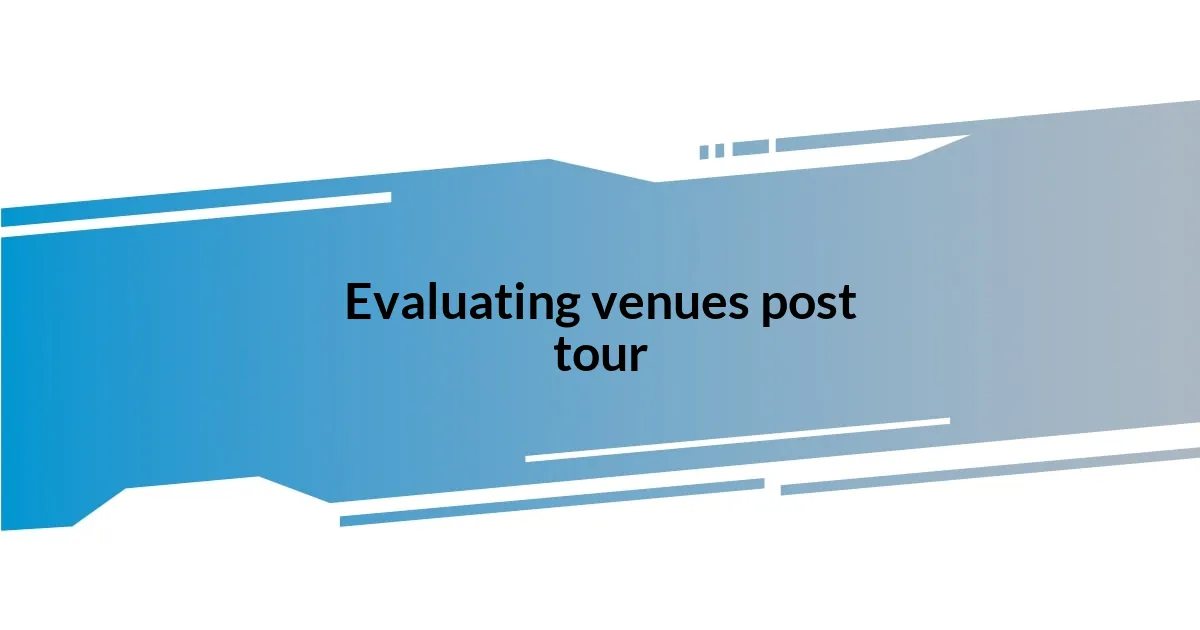
Evaluating venues post tour
Evaluating venues after a tour is a crucial step in the planning process. One time, I jotted down my immediate impressions right after a walkthrough of a popular event space. While the venue had a striking aesthetic, my notes revealed an underlying concern about its acoustics for speeches. It’s peculiar how your gut feelings, when recorded promptly, can lead to significant decisions later. Have you ever had a moment where first impressions quietly shifted with reflection?
I often find that my evaluations become richer when I compare venues side by side. After visiting three different locations in one day, I realized that the unique features of each space stuck with me. I drew a chart to weigh aspects like seating, lighting, and vibe, which transformed my subjective views into objective insights. This exercise helped me recognize patterns that aren’t always visible at first glance. Isn’t it fascinating how a simple comparison can shed light on what truly matters for your event?
Lastly, I believe that revisiting the venue’s website and reviewing any promotional materials post-tour can offer further clarity. After touring a modern loft-style venue, I checked their online portfolio and saw successful events that sparked new ideas for my own vision. The photos resonated with my initial impressions and reignited my excitement. Have you ever experienced how a venue’s online presence can enhance or diminish your enthusiasm? It’s like revisiting the emotions you felt during the tour but with a fresh perspective.
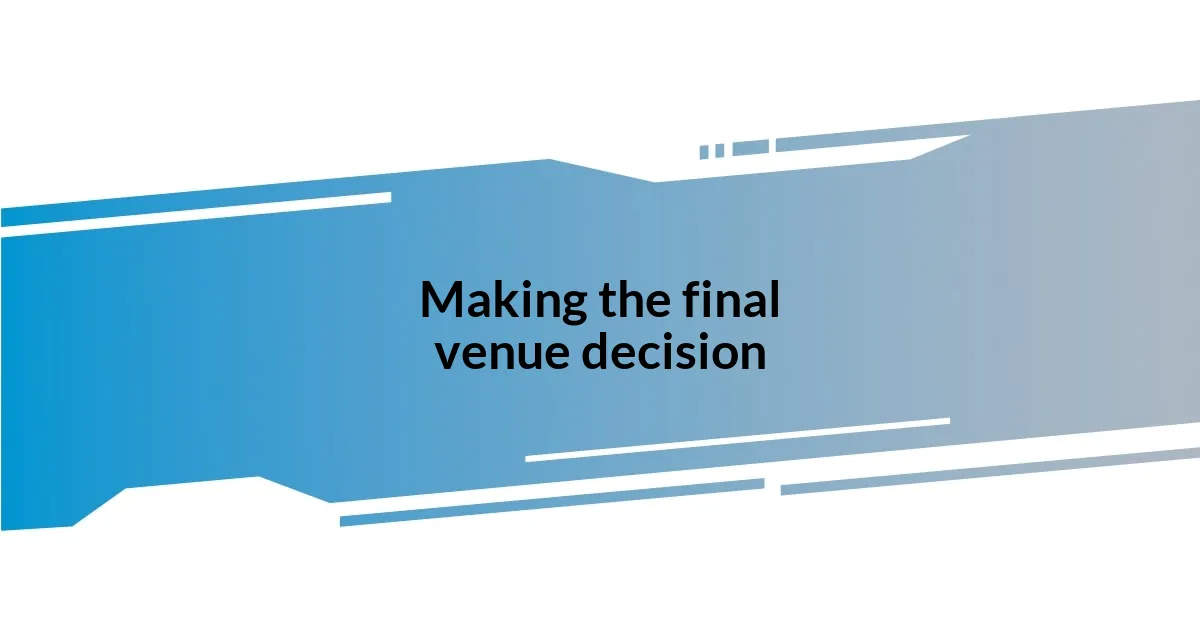
Making the final venue decision
Making the final decision on a venue is often the culmination of various factors, both emotional and logistical. For instance, I vividly recall a time when I had two options that were neck and neck in terms of aesthetics and size. However, the moment I envisioned my guests at both venues, one felt like an inviting embrace, while the other seemed more like a formal handshake. It’s amazing how that emotional connection can pivot your choice, isn’t it?
Another aspect I can’t stress enough is the importance of alignment with your vision and budget. During one of my venue hunts, I was captivated by a space with breathtaking views but discovered that their additional fees for amenities would break my budget. I learned that passion can sometimes cloud financial reality; so, I started asking, “How does this venue fit within my overall vision?” Doing so helped prevent the unpleasant surprise of expensive add-ons later on. Have you ever fallen in love with a place only to face an inconvenient truth about cost?
Ultimately, I trust my instincts to guide me when it comes to making that final call. For example, after visiting a rustic barn venue, I felt an overwhelming sense of warmth and comfort. I even imagined the laughter, the toasts, and the beautiful moments that could take place there. That emotional pull made it clear to me that it wasn’t just about the space; it was about the memories that could be created within those walls. Have you found that the heart often knows what the mind overlooks? Trusting that instinct is something I’ve come to value immensely.